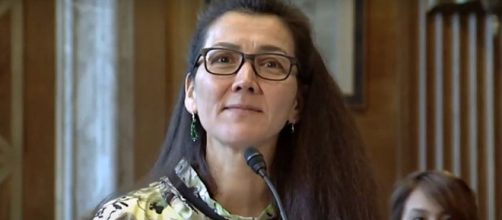Alaska's sole seat in the United States House of Representatives has been vacant for nearly six months. This was due to the passing of longtime U.S. Representative Don Young. A Republican, Young was the longest-serving member of the House at the time of his death. He chaired the House Resources and Transportation and Infrastructure committees during his Congressional career.
As a result of his death, a special election was called to fill the seat for the remainder of Young's term. That term is set to expire early next year. A separate race is slated for November as part of the United States midterm elections to take over from there.
But a possible preview of that race has now been completed with results that have taken some onlookers aback.
Peltola is victorious over Palin
Democrat Mary Peltola has won the special election for Alaska's seat in the U.S. House of Representatives. As noted by Politico, the result has been considered an upset. Peltola's main rival in the race was a high-profile one in Republican Sarah Palin.
The special election was the first to implement Alaska's new ranked-choice voting system. Ranked choice systems are fairly rare, though not unheard of. It's perhaps most well-known as the main voting method in Australia and the Republic of Ireland. Alaska is the second state to implement it permanently statewide, following Maine.
Dozens of candidates were eligible to win at one point in the race. Over time, it was widdled down to Peltola and Palin. Republican Nick Begich III, the scion of Alaska's most famous Democratic political dynasty, ultimately finished in third place.
The Anchorage Dailey News indicates that the race actually struck something of a civilized and respectful tone.
Between Peltola and Palin, at least. Relations between fellow Republicans Palin and Begich were a bit tenser. The two women reportedly exchanged good-natured text messages on election day, which was August 16. Following the two-week-long counting of votes, the two appeared together publicly on the day of the results. She was even embracing in a hug at one point.
Whereas some unsuccessful candidates have taken to floating unfounded conspiracy theories about voter fraud, Palin did not. Instead, calling the election "a legally sanctioned process."
But matters regarding Alaska's U.S. House won't necessarily be settled for long. Peltola, Palin, and Begich are all candidates in the November race for a full term in the seat.
Peltola is the first native Alaskan to be elected to the U.S. House of Representatives
Mary Peltola is a native of Anchorage, Alaska, and is of Yup'ik descent. Her father, Ward Sattler, ran for the Alaska House of Representatives three times but never won. Her husband, Gene, has been a local politician in Bethel in western Alaska.
She would attend the University of Northern Colorado, followed by the University of Alaska Fairbanks, the University of Alaska Southeast in Juneau, and the University of Alaska Anchorage.
The Alaska Department of Fish and Game employed her to work with herring and salmon. She would later tout her 'pro-fish' platform in her Congressional campaign.
Peltola was first elected to the Alaska House of Representatives in 1998, defeating the incumbent in the Democratic primary. She would be re-elected four times. In 2011, she won a seat on the Bethel City Council. Additionally, she became a tribal court judge for the Orutsararmiut Traditional Native Council.
Palin famously nearly became the vice president of the United States
Sarah Palin, maiden name Heath, is originally from Sandpoint in northern Idaho. Her family eventually settled in Wasilla, Alaska, near Anchorage. While attending Wasilla High School, she was a member of the girls' cross country and basketball teams.
For the latter, she was a co-captain of a state championship team.
She began her collegiate studies at the University of Hawai'i at Hilo on the Big Island. She then transferred to Hawaii Pacific University, located in Honolulu. Palin made further stops, including at North Idaho College in Coeur d'Alene and Matanuska-Sustina College in Palmer, Alaska. Eventually, she graduated from the University of Idaho.
Palin went into sports journalism, covering the subject on television for KTVA and KTUU in Anchorage. And in print for the Mat-Su Valley Frontiersman in Wasilla.
She was elected to the Wasilla City Council in 1992. Four years later, she was elected the city's mayor and would be re-elected in 1999.
In 2002, Palin ran in the Republican primary for lieutenant governor of Alaska. She lost to State Senator Loren Leman, who did become lieutenant governor after Republican Frank Murkowski won the governorship.
Murkowski reportedly considered appointing Palin to the United States Senate at one point, but in the end didn't. In 2006, Palin ran in the Republican primary for governor and won easily. Incumbent Murkowski finished in a distant third place, behind former State Representative and Senator John Binkley. In the general election, Palin prevailed over Democratic former Governor Tony Knowles.
In 2008, Arizona U.S. Senator and Republican Presidential nominee John McCain selected Palin as his would-be vice president.
Initially a popular choice, Palin would make a number of controversial statements and gaffes during the campaign.
She has since been viewed as one of the most polarizing figures in American politics, including in Alaska. She resigned as governor in 2009 and became a television personality.


